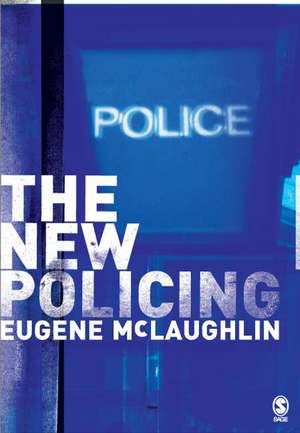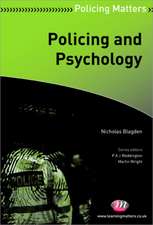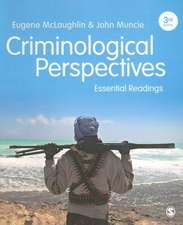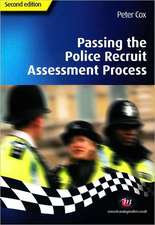The New Policing
Autor Eugene McLaughlinen Limba Engleză Paperback – 15 noi 2006
-the reconfiguration of police culture;
-organisational issues and dilemmas currently confronting the police;
-the managerial reforms and professional; innovations that have been implemented in recent years;
-the future of policing, security and crime control.
In offering this discussion of the nature and role of the police, The New Policing illustrates the need to re-examine and re-think the theoretical perspectives that have constituted policing studies. Examining evidence from the United Kingdom, the United States and other western societies, the book promotes and enables an understanding of the cultural and symbolic significance of policing in society.
This ground-breaking text has been constructed to ensure that it touches on all the key issues that any course on police and policing will cover. It is an essential purchase for all students of policing and criminal justice, and academics and professionals working in this field.
Preț: 500.64 lei
Preț vechi: 588.99 lei
-15% Nou
Puncte Express: 751
Preț estimativ în valută:
95.79€ • 100.29$ • 79.27£
95.79€ • 100.29$ • 79.27£
Carte tipărită la comandă
Livrare economică 07-21 aprilie
Preluare comenzi: 021 569.72.76
Specificații
ISBN-13: 9780803989054
ISBN-10: 0803989059
Pagini: 264
Ilustrații: black & white illustrations
Dimensiuni: 170 x 242 x 15 mm
Greutate: 0.45 kg
Ediția:1
Editura: SAGE Publications
Colecția Sage Publications Ltd
Locul publicării:London, United Kingdom
ISBN-10: 0803989059
Pagini: 264
Ilustrații: black & white illustrations
Dimensiuni: 170 x 242 x 15 mm
Greutate: 0.45 kg
Ediția:1
Editura: SAGE Publications
Colecția Sage Publications Ltd
Locul publicării:London, United Kingdom
Recenzii
'A lucid, comprehensive and stimulating state-of-the-art analysis of the bewilderingly complex contemporary changes in policing. This will be a standard resource for students and scholars of policing for a long time to come.' -
Robert Reiner, Professor of Criminology
London School of Economics and Political Science
'Highly original, The New Policing is a significant contribution whose implications extend well beyond the British context and reflect on contemporary policing across the English-speaking world.' -
Pat O’Malley
Canada Research Chair in Criminology and Criminal Justice, Carleton University, Canada
'Deeply informed, penetrating, challenging and readable. Eugene McLaughlin analyses 'the state we're in' with respect to policing' -
P.A.J. Waddington, Professor of Political Sociology
University of Reading, UK
'The landscape of police and policing is rapidly changing. McLaughlin locates this change in the media imagery of policing and in the very real fragmented, global context of contemporary policing. When I got to the end, I wanted the debate to continue. This book is valuable in taking our discussions about policing and policing from a clear documentation of how much has changed in policing England and Wales in the last 20 years.' -
Elizabeth Stanko
Robert Reiner, Professor of Criminology
London School of Economics and Political Science
'Highly original, The New Policing is a significant contribution whose implications extend well beyond the British context and reflect on contemporary policing across the English-speaking world.' -
Pat O’Malley
Canada Research Chair in Criminology and Criminal Justice, Carleton University, Canada
'Deeply informed, penetrating, challenging and readable. Eugene McLaughlin analyses 'the state we're in' with respect to policing' -
P.A.J. Waddington, Professor of Political Sociology
University of Reading, UK
'The landscape of police and policing is rapidly changing. McLaughlin locates this change in the media imagery of policing and in the very real fragmented, global context of contemporary policing. When I got to the end, I wanted the debate to continue. This book is valuable in taking our discussions about policing and policing from a clear documentation of how much has changed in policing England and Wales in the last 20 years.' -
Elizabeth Stanko
Cuprins
PART ONE: THE CULTURAL CONSTRUCTION OF THE POLICE
Cultural construction of the English Police
The iconic PC:
George Dixon
The Blue Lamp
The Murder of PC George Dixon
PART TWO: THE SOCIOLOGICAL CONSTRUCTION OF THE POLICE
Michael Banton and The Policeman in the Community
Policing British Pre-Modernity
Policing American Modernity
Policing British Modernity
PART THREE: POLICE STUDIES
Traditional Perspectives
Ethnographic Perspectives
Marxist Perspectives
Administrative Perspectives
Left realist Perspectives
PART FOUR:POLICE STUDIES
New Perspectives
Security Governance
The future configuration of Policing
Nodalization
Residualization
Managerialization
Re-sovereignization
Global Securitzation
PART FIVE: POLICING CRIME AND DISORDER
Insecurities of the Metropolis
The Bright Blue Lamp
The Dimming Blue Lamp
Relighting the Blue Lamp?
Cultural Disintegration: the broken 'spectacle' of policing
PART SIX:POLICE CULTURE
Policing the multi-cultural society
Beyond Scarman
Macpherson and 'Institutional Racism'
Beyond Macpherson
The Secret Policeman
Explaining Racist Culture
De-contaminating Racist Culture
PART SEVEN: POLICE GOVERNANCE
Officer Level Accountability
Force Level Accountability
Democratic Accountability
'New Localism'
PART EIGHT: POLICING NEW TERRORISM
The darkening skies over the metropolis
The rules have changed
Policing the post 7/7 Terrorist Threat
Shoot-to-Kill-to-Protect
What kind of police force do we want? 2012 Vision
Cultural construction of the English Police
The iconic PC:
George Dixon
The Blue Lamp
The Murder of PC George Dixon
PART TWO: THE SOCIOLOGICAL CONSTRUCTION OF THE POLICE
Michael Banton and The Policeman in the Community
Policing British Pre-Modernity
Policing American Modernity
Policing British Modernity
PART THREE: POLICE STUDIES
Traditional Perspectives
Ethnographic Perspectives
Marxist Perspectives
Administrative Perspectives
Left realist Perspectives
PART FOUR:POLICE STUDIES
New Perspectives
Security Governance
The future configuration of Policing
Nodalization
Residualization
Managerialization
Re-sovereignization
Global Securitzation
PART FIVE: POLICING CRIME AND DISORDER
Insecurities of the Metropolis
The Bright Blue Lamp
The Dimming Blue Lamp
Relighting the Blue Lamp?
Cultural Disintegration: the broken 'spectacle' of policing
PART SIX:POLICE CULTURE
Policing the multi-cultural society
Beyond Scarman
Macpherson and 'Institutional Racism'
Beyond Macpherson
The Secret Policeman
Explaining Racist Culture
De-contaminating Racist Culture
PART SEVEN: POLICE GOVERNANCE
Officer Level Accountability
Force Level Accountability
Democratic Accountability
'New Localism'
PART EIGHT: POLICING NEW TERRORISM
The darkening skies over the metropolis
The rules have changed
Policing the post 7/7 Terrorist Threat
Shoot-to-Kill-to-Protect
What kind of police force do we want? 2012 Vision
Notă biografică
Eugene McLaughlin is Professor of Criminology and co-director of the Centre for Crime and Justice Research. He is also a member of the Centre for Law Justice and Journalism. He completed his postgraduate criminology studies at the University of Cambridge and the University of Sheffield. Eugene has held various academic appointments including at the University of Hong Kong, the Open University and the University of Southampton. He has also been Visiting Professor at the Department of Sociology, John Jay College of Criminal Justice, New York, the Department of Communication Studies, University of North Carolina, Chapel Hill and Distinguished Visiting Fellow at the Helsinki Collegium for Advanced Studies. He is an associate editor ofCrime, Media and Cultureand is on the editorial board ofCriminal Justice Matters. He has served on the editorial boards of theBritish Journal of Criminology,Critical Social Policy, theHoward Journal of Criminal Justiceand was co-editor ofTheoretical Criminology.
Descriere
The New Policing provides a comprehensive introduction to the critical issues confronting policing today. It incorporates an overview of traditional approaches to the study of the police with a discussion of current perspectives.










